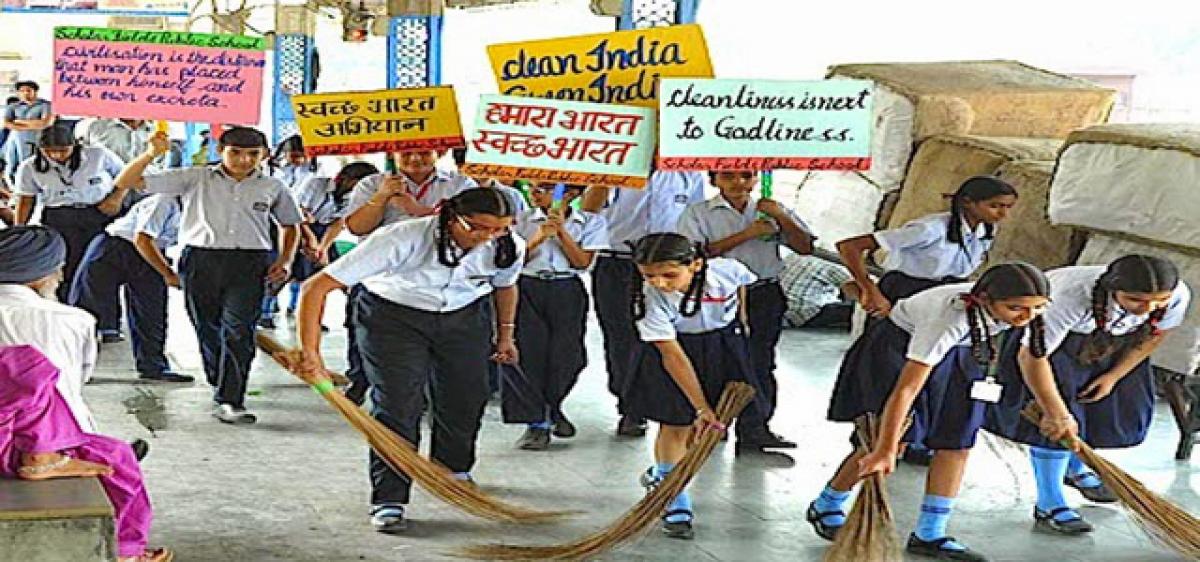Live
- Chanchalguda Jail Officials Say They Haven't Received Bail Papers Yet, Allu Arjun May Stay in Jail Tonight
- BJP leaders present evidence of illegal voters in Delhi, urge EC for swift action
- Exams will not be cancelled: BPSC chairman
- Nagesh Trophy: Karnataka, T.N win in Group A; Bihar, Rajasthan triumph in Group B
- YS Jagan condemns the arrest of Allu Arjun
- Economic and digital corridors to maritime connectivity, India and Italy building vision for future, says Italian Ambassador
- SMAT 2024: Patidar's heroics guide Madhya Pradesh to final after 13 years
- CCPA issues notices to 17 entities for violating direct selling rules
- Mamata expresses satisfaction over speedy conviction in minor girl rape-murder case
- Transparent Survey Process for Indiramma Housing Scheme Directed by District Collector
Just In

The Centre for Science and Environment (CSE) on Thursday said that despite huge investments, the Swachh Bharat Mission is failing to achieve the desired results due to lack of credible on-ground data.
New Delhi: The Centre for Science and Environment (CSE) on Thursday said that despite huge investments, the Swachh Bharat Mission is failing to achieve the desired results due to lack of credible on-ground data.
Pointing out the importance of the large-scale campaign for bringing behavioural change in people to promote the use of toilets, at its National Consultation on Sustainable Rural Sanitation organised here, CSE said that it is data that will connect the issue with health impacts and lead to impact on the ground.
"Currently, India does not have any mechanism for tracking water-borne diseases to shed more light about the progress on the sanitation programme," CSE said, adding that it will set up India's first faecal sludge laboratory.
"We are also setting up India's first faecal sludge laboratory to test technologies for their effectiveness," said Sunita Narain, Director General, CSE, adding that this will be a crucial first step towards such data gathering, especially in understanding sanitation in the rural context.
Stating that the Swachh Bharat Mission, a pet project of Prime Minister Narendra Modi that aims to make the country free of the open defacation by 2019, is already lagging behind from its target. The mission completed its two years this October 2.
"The government lags behind in meeting its target... 82.3 million (or 823 lakh) toilets are yet to be constructed across India by October 2, 2019. This means the country needs to build 2.3 million (23 lakh) toilets every month -- or a formidable 56 toilets every minute -- to meet the target," CSE said.
Urging to look at the Swachh Bharat Mission beyond being -- "just another failed government scheme" -- CSE's consultation found issues in term of the data-driven behavioural change in people, as the major reason for the scheme's failure so far in addition to the traditional problems of poverty, lack of access to water and lack of land to name a few.
Urging to look at the Swachh Bharat Mission beyond being -- "just another failed government scheme" -- CSE's consultation found issues in term of the data-driven behavioural change in people, as the major reason for the scheme's failure so far in addition to the traditional problems of poverty, lack of access to water and lack of land to name a few.
"Our experience and our work in air pollution bears out that change happens when we make a connection to people's health. And the issue needs to be handled differently for rural and urban areas.
While in the urban milieu toilets have to be linked with disposal and treatment systems, in rural areas the priorities should be to address the issue in the context of poverty, behavioural change by linking it with health, water availability, toilet design and waste disposal," Narain said.
Speaking of the "behaviour-change", Parameswaran Iyer, Secretary, Ministry of Drinking Water and Sanitation said, "It took 30-40 years for people in the US to accept seat belts. In India, we are trying to compress the time frame in the context of sanitation.
The challenge here is how does one scale up while maintaining quality and sustain the momentum after triggering such behavioural change."The CSE also said that Sikkim has achieved 100 per cent sanitation coverage through a combination of positive and negative pressure.
"Sikkim is one of the successful states that achieved complete sanitation coverage. Haryana and Kerala excelled in their respective sanitation programmes, while states like Jharkhand, Bihar and Odisha failed miserably," CSE said.
Rajkumar Yadav, District Collector, South Sikkim, said, "We followed a strategy of putting two different types of pressure on the people -- one positive and the other negative. Positive pressure was put through campaigns and social messaging across sections of society.
Negative pressure was applied by restricting and denying government benefits to those who haven't constructed toilets or haven't given up open defecation. This has helped create an overall positive impact."

© 2024 Hyderabad Media House Limited/The Hans India. All rights reserved. Powered by hocalwire.com







